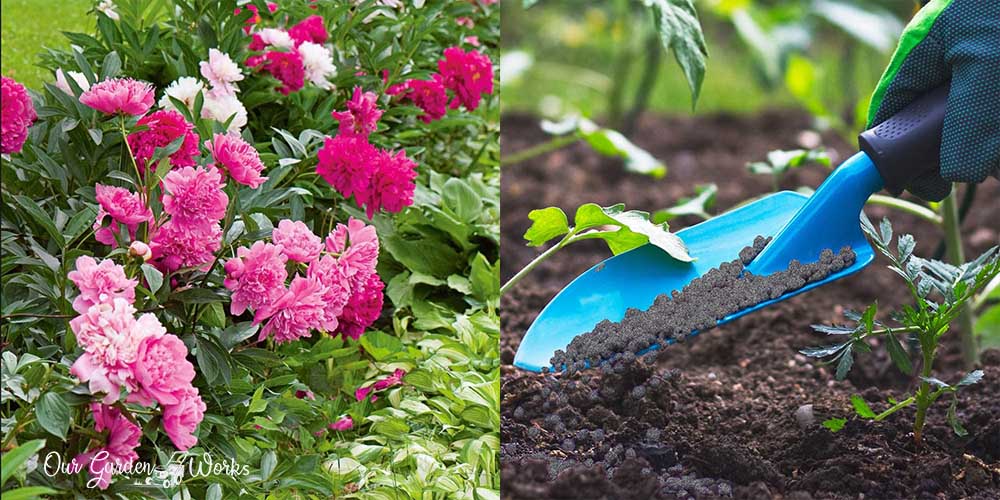Peonies are one of the lovely stars of spring and one of the first flowers that spruce up your garden.
They are low-maintenance flowers but you can give them a little treat by learning more about the best fertilizers for peonies.
These perennial flowers, which come in pink, white, yellow, and red, once established can live for a very long time without too much care.
Just like most flowering plants, fertilizers with high phosphorus content would be the most ideal for peonies. They need nitrogen but it should be less than phosphorus and potassium.
Some gardeners consider compost to be enough to nourish peonies but you may give them some extra care to boost their blooms and keep them healthy.
The ideal fertilizers for peonies that work are usually fertilizers for rose, bulb, and perennial fertilizer or something general like bone meal. You can also look for mushroom composts and phosphate rock dust in other types of fertilizer to know if they are good for your peonies.
In A Hurry, Our Top Picks:
- Dr. Earth Bud & Bloom: Best Organic Fertilizer for peonies
- Espoma Flower-Tone: Most Affordable Fertilizer for peonies
- EarthPods Premium Flowering Plant Food: Most Convenient and Promising fertilizer for peonies
In this post, we will share the best fertilizers for your peonies so you won’t have to deal with the extensive research and get stuck on trial and error.
Let’s start!
10 Best Fertilizer For Peonies [Top Picks For 2023]
Before you head to the different fertilizers in the market, you must first learn about the meaning of the NPK ratio.
NPK stands for nitrogen, phosphorus, and potassium content of a fertilizer. It is represented by the three numbers that you often see in the packaging of fertilizers like 10-10-10.
Now, let’s check out the top 10 fertilizers for peonies and other perennial flowers this year:
1. Lilly Miller Fertilizer 5-10-10
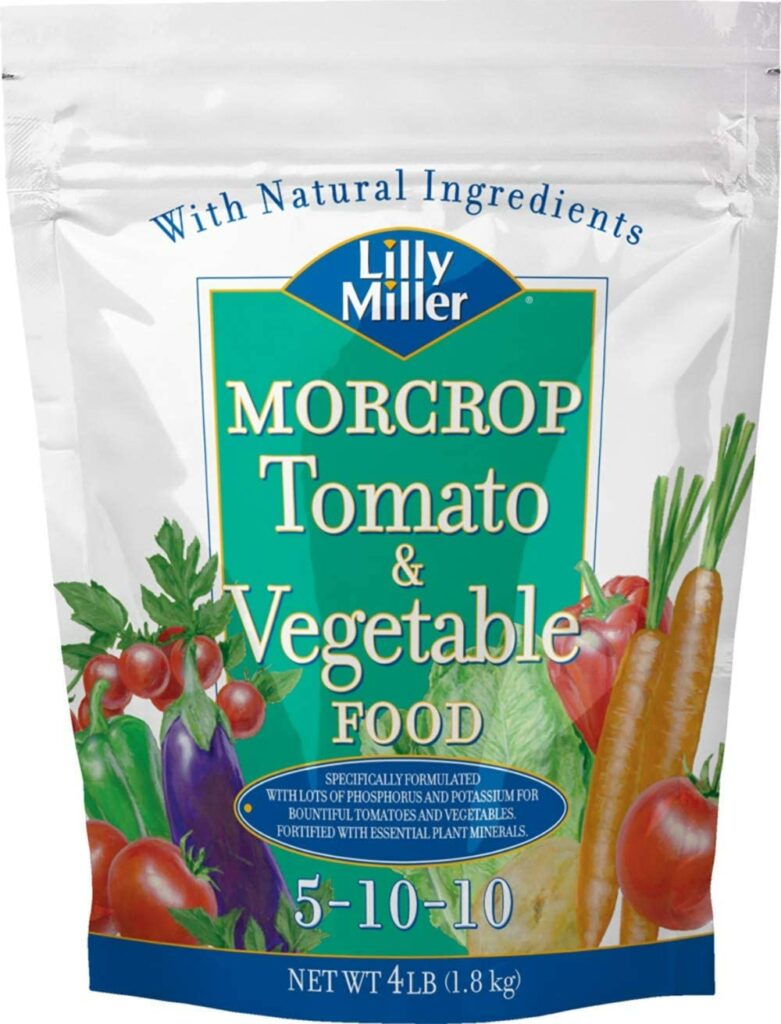
One of the fertilizers with the best NPK ratio suitable for peonies is the Lilly Miller Fertilizer. It is a slow-release fertilizer that has a higher phosphorus and potassium content that is suitable for flowering plants, fruits, and vegetables. It contains natural ingredients including pet manure and other minerals like calcium.
Aside from peonies, it also works best for:
- Tomatoes
- Vegetable gardens
- Container gardens
This fertilizer is derived from natural ingredients and trace minerals to ensure the continuous feeding of your peonies. The nitrogen content is derived from three sources such as ammoniacal nitrogen, other water-soluble nitrogen, and water-insoluble nitrogen.
It is derived from the following natural materials:
- Dried poultry waste
- Bone meal
- Alfalfa meal
- Ammonium sulfate
- Ammonium phosphate
- Muriate of potash
- Calcium and sodium borate
- Iron sucrate
- Manganese sucrate
- Sodium molybdate
- Zinc sucrate
Most gardeners love it for its ability to resurrect dying tomatoes and flowering plants. Many turn to this fertilizer after having several failed attempts from mainstream brands of fertilizers.
However, since it contains animal manure, you should expect some smell when you apply it to your plants. So, some gardeners don’t use it for indoor use.
Due to the strong smell of this fertilizer, it may also attract your dogs and other pets to eat. If they accidentally eat it, your pets may get sick and have diarrhea.
Make sure to store it in a location where children and pets can’t access it. You should also mix it well with the soil to prevent your pets from eating clumps of this product.
Pros
- Multi-purpose
- Contains nutrients that work well on peonies
- With extra calcium
- Derived from natural ingredients
Cons
- Has a bit of smell
- Not suitable for indoor gardening due to its smell
- Non-vegan gardening
2. JR Peters Classic Fertilizer Jacks No. 1.5
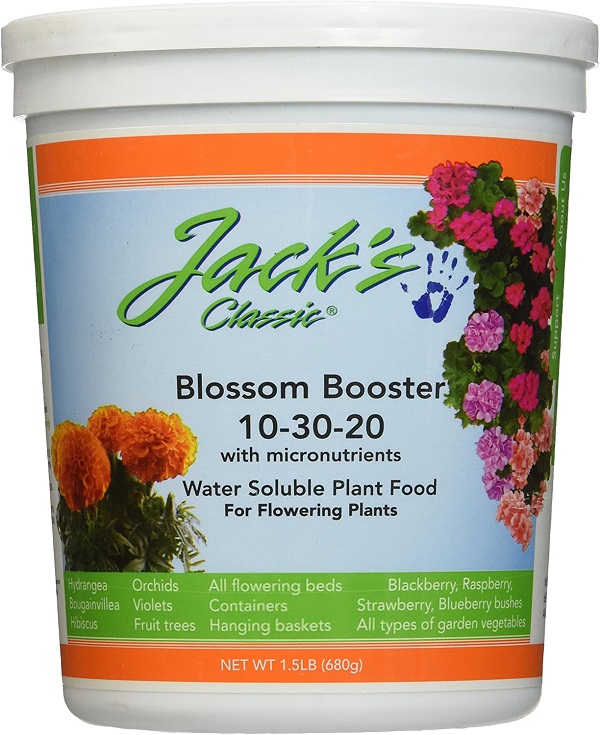
JR Peters Classic Fertilizer Jacks No. 1.5 is one of the popular brands of fertilizer for boosting the bloom production of flowering plants like peonies. It is a water-soluble fertilizer that allows your plants to absorb the nutrients immediately as soon as the roots absorb water.
It is derived from the following materials:
- Monoammonium phosphate
- Monopotassium phosphate
- Potassium nitrate
- Magnesium sulfate
- Boric acid
- Iron EDTA
- Manganese EDTA
- Zinc
- Copper
- Ammonium molybdate
It is a 10-30-20 NPK fertilizer that puts more effort into boosting bloom production with its high phosphorus content. It is also packed with micronutrients that enrich the soil to nourish the plant from the roots to its leaves.
Aside from peonies, you can also use this fertilizer for the following plants:
- Hydrangea
- Hibiscus
- Bougainvillea
- Orchids
- Violets
- Fruit trees
- Geraniums
- Impatiens
- Begonias
- Marigolds
The best thing about this fertilizer is its formulation. Water-soluble fertilizers can feed your plants through nutrient absorption from the leaves and roots. It also doesn’t contain urea and other toxic ingredients. Most gardeners also notice that it lasts longer than other mainstream brands of fertilizers.
The only catch is this fertilizer is not derived from organic materials that may concern some gardeners. It is also a bit pricey which may come as a disadvantage for some thrifty green thumbs.
Pros
- Has a high phosphorus content that is good for peonies
- Good packaging
- The water-soluble formulation makes it faster to see results.
- Feeds plant through the leaves and roots of peonies
- No urea included
Cons
- A bit pricey
- Non-organic materials
3. Scott’s Super Bloom Water Soluble Plant Food
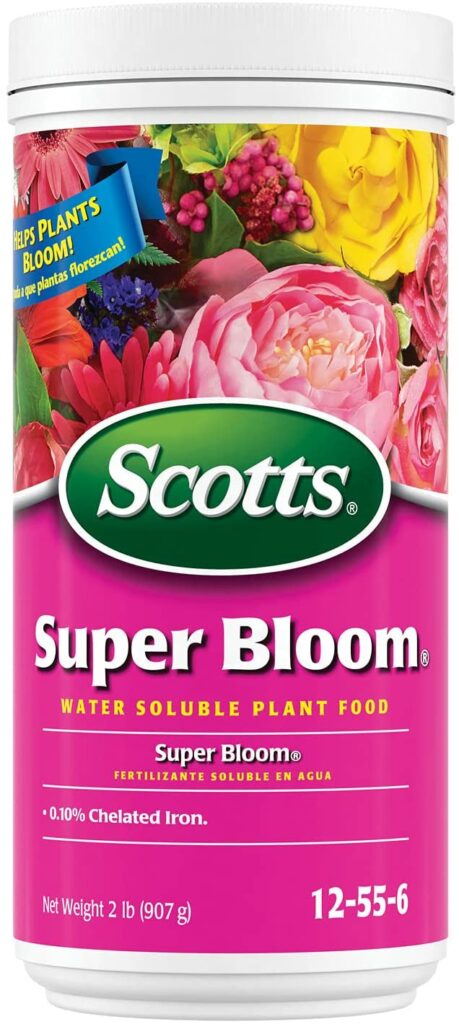
Scott’s Super Bloom Water Soluble Plant Food is among the few fertilizers with the most phosphorus content in the market. It is designed to support the bloom production of your peonies and keep them providing more vibrant and bigger blooms throughout the growing season. It is also formulated to be absorbed by your plants through their leaves and roots.
This fertilizer has an NPK ratio of 12-55-6. It is derived from ammonium phosphate, urea, potassium phosphate, and iron. It is water-soluble, so as your plants absorb water from the soil or leaves, the nutrients will also be distributed. Therefore, you will see immediate results after a week or two.
A gallon of this fertilizer only needs one to two tablespoons of granules which can last you for about 2 to 5 months, depending on the number of plants you’re feeding. The good feature of this fertilizer is its unique NPK ratio that will surely make any flowering plant bloom in no time. Its water solubility is also a plus especially for those impatient gardeners who want to see the result immediately.
The only catch with this fertilizer is it is not organic. Some gardeners are also conscious of the urea content which this fertilizer has. However, performance-wise this fertilizer will surely give you the quality blooms of peonies you’re looking for.
Pros
- High phosphorus content
- Immediate results
- Affordable
- Extra iron content
- A little goes a long way
Cons
- Non-organic
- Contains urea
4. Dr. Earth Organic Bud & Bloom Fertilizer
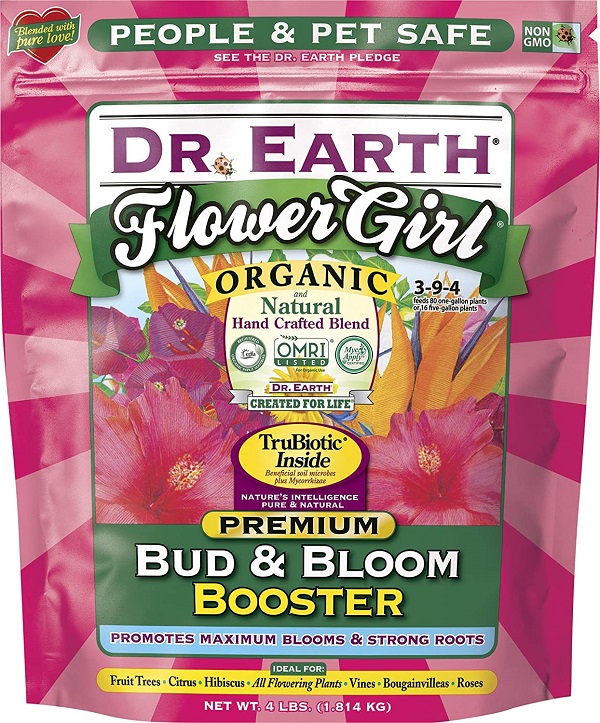
If you are going for organic fertilizer, you can never go wrong with Dr. Earth Organic Bud and Bloom Fertilizer. It is probably the purest form of organic fertilizer in the market since they are using food-grade organic materials.
This brand also prides itself on not using poultry manure and GMO-infested chicken manure in its fertilizers.
This fertilizer has a 3-9-4 NPK ratio. It is enhanced with TruBiotic which includes soil microbes and mycorrhizae that help break down nutrients and make them readily available for your peonies.
To enhance your plant’s nutrition, it is also packed with humic acids derived from Leonardite. This fertilizer is derived from the following organic materials:
- Bone meal
- Fishbone meal
- Alfalfa meal
- Potassium sulfate
- Feather meal
- Kelp meal
- Kelp flour
The most outstanding feature of this product is its cleanliness when it comes to its ingredients. Even the most health-conscious gardener would consider sticking to those brands in growing their vegetables and flowering plants. It is free from any harsh chemicals that may harm the environment. Plus, it is kid and pet-friendly.
The only catch with most organic fertilizers like Dr. Earth is its strong smell. Some gardeners can be sensitive to the smell wherein they don’t consider using it indoors. Also, your pets can be attracted to its smell and try to stay around your garden more often.
Other than that, this fertilizer is probably the best one that you can have when it comes to quality. Additionally, it is OMRI-listed and holds several certifications from organic institutions.
Pros
- Highest-quality organic materials
- No GMO-infested chicken and animal manure
- Safe to use around kids and children
- With s high amount of phosphorus to boost bloom production in peonies
- OMRI-listed
Cons
- Has a typical organic smell that makes it too smelly to use indoors
- A bit pricey
5. Espoma Flower Tone
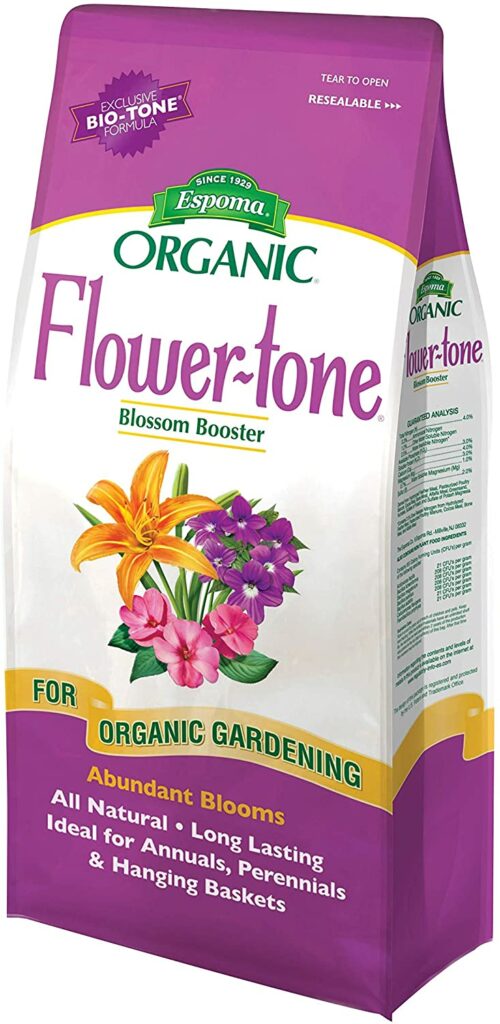
If you’ve been around the market, looking for fertilizers, it’s hard to miss Espoma Flower Tone. It is another organic fertilizer that comes as a competition with Dr. Earth. However, it has its own charms and prides itself on not containing any fillers or sludges. It is ideal for:
- Annuals
- Perennials
- Hanging baskets
It is a slow-release fertilizer with an NPK ratio of 3-4-5. It also has its own Bio-Tone formula that contains beneficial soil microbes and mycorrhizae to speed up the breakdown of nutrients and make them readily available for your plants. Another feature is it contains extra contents like humic acids derived from Leonardite.
It is derived from the following organic materials:
- Feather meal
- Poultry manure
- Bone meal
- Alfalfa meal
- Greensand
- Sulfate of potash
- Sulfate potash of magnesia
Since this is a slow-release fertilizer, you only need to feed your peonies once every three weeks that add up to the convenience. It is also free from any harsh chemicals that can pollute the aquatic environment in your area. Lastly, it is way more affordable than other brands without giving up on the quality of materials.
When it comes to smell, you should expect that Espoma Flower-Tone has a typical organic smell. So some gardeners don’t use it indoors. It can also be hard to let the beads stay on top of the soil because pets may eat them.
So, if you are into the fuzzy smell and your pests get into a frenzy for the organic smell of fertilizers, this may not be suitable for you.
Pros
- Affordable
- Organic fertilizer
- Contains extra nutrients like humic acid and Bio-tone
- Ensures continuous feeding for three weeks
- Boosts bloom production for longer periods
Cons
- Organic smell
- The smell can attract pets in your garden
- Contains poultry manure which makes it not suitable for vegan gardening
6. Jobe’s Organics Annuals & Perennials Granular Plant Food
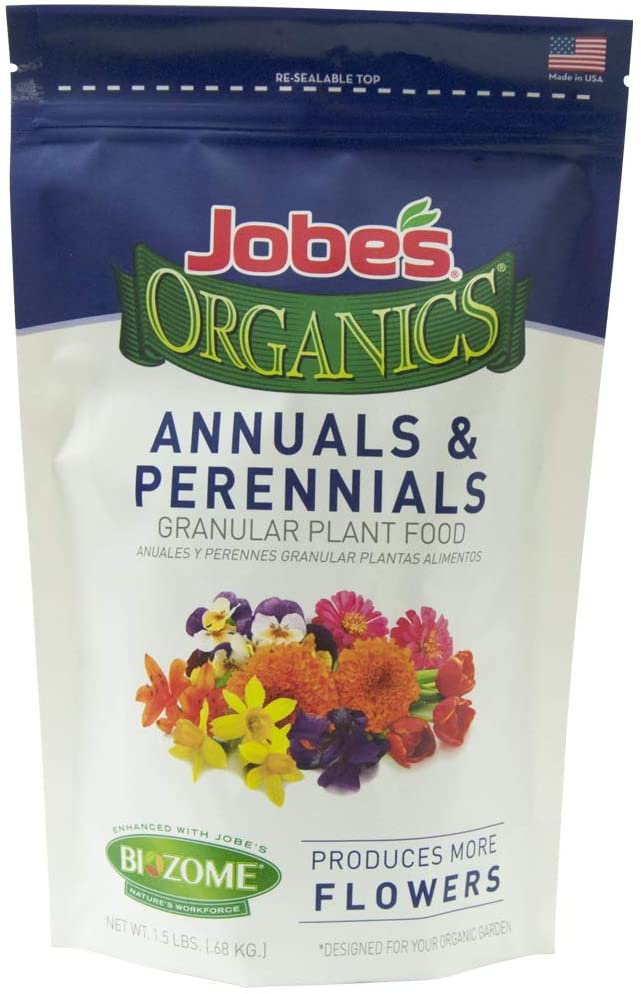
Jobe’s Organics Annuals & Perennials Granular Plant Food is another organic option popular with most gardeners. It is a granular fertilizer ideal for soil preparation, planting seeds and seedlings, and replanting established annuals and perennials flowering plants.
This fertilizer has an NPK ratio of 3-5-4. The fertilizer’s formula is enhanced with Biozome that contains soil microbes to speed up the breakdown of organic materials and make them ready for your peonies, resulting in faster results.
It is derived from the following organic materials:
- Bone meal
- Feather meal
- Potassium
- Processed manure
This fertilizer doesn’t contain any synthetic chemicals and has been certified by OMRI-listed. The Biozome technology helps your peonies produce better blooms and become more resistant to drought, pests, and diseases. It also doesn’t have any content that may harm the environment and can endanger your kids and pets.
If you’re a vegan gardener, this may not be a suitable fertilizer for you since it contains processed manure. Along with that, it also gives off an organic smell which inhibits some gardeners to use it indoors.
Pets may also get attracted and go nuts with the smell so you should brace yourself for some fencing tasks.
Pros
- Organic fertilizer
- Affordable
- Contains extra nutrients and Biozome
- Safe for the environment, kids, and pets
- Multi-purpose
- Affordable
Cons
- Organic smell
- Contains processed manure that may not suitable for vegan gardeners
7. EarthPods Premium Bloom Flowering Plant Food Spikes
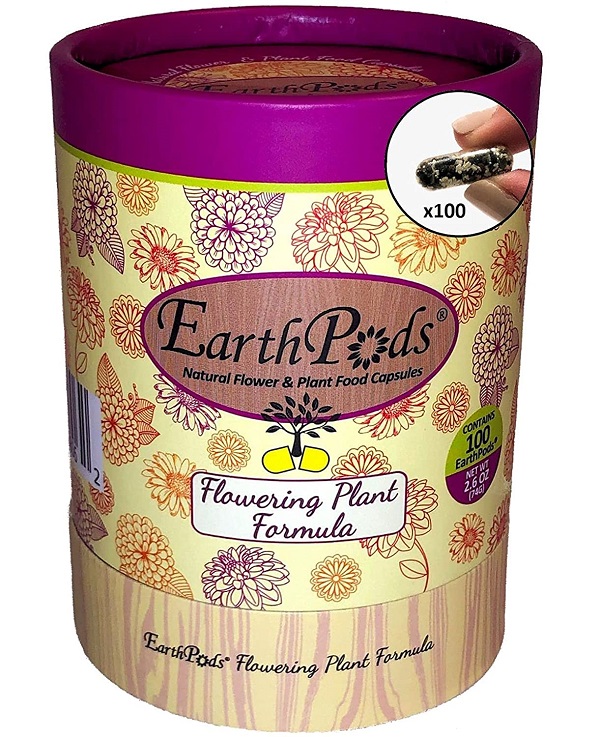
Now, moving to another form of fertilizer, EarthPods Premium Bloom Flowering Plant Food Spikes is a good way to discover one.
If you’re done with mixing and measuring fertilizers, EarthPods spikes are just as easy as putting a capsule in the soil. Plus, it is an organic fertilizer that keeps your garden toxic-free.
This fertilizer has an NPK ratio of 0.2-0.2-0.4. It is made of organic materials that don’t contain urea and other chemicals. A capsule can continuously feed your peonies for 14 to 21 days. Each container of EarthPods contains around 100 capsules and is made of eco-friendly materials.
Aside from peonies, you can also use it for:
- Begonia
- Biden
- Calibrachoa
- Celosia
- Coleus
- Cleome
- Clematis
- Cosmos
- Cuphea
- Daisy
- Daffodil
- Euphorbia
- Fuchsia
- Gardenia
- Geranium
- Impatiens
- Iris
- Lobelia
- Marigold
- Morning Glory
- Pansy
- Petunia
- Poppy
- Roses
- Rudbeckia
- Salvia
- Snapdragon
- Sweet Potato Vine
- Tulip
- Verbena
- Vinca
- Zinnia
Fertilizer spikes are fairly easy to use and do not need any preparation. This particular brand is organic but does not have a fuzzy smell. Therefore, you can freely use it indoors and outdoors. Your pets won’t also keep looking for it. This fertilizer is also safely formulated to use around kids and pets.
The only catch with this fertilizer is it’s a bit pricey than its competitors. Other than that, it is completely one of the most convenient fertilizers for a wide range of flowering plants.
It also doesn’t contain toxic chemicals that can pollute the bodies of water in your area.
Pros
- Easy-to-use
- No mixing and no mess
- Organic fertilizer
- No smell
- Feeds plants up to two weeks
- No urea
- Vegan-friendly
- Child and kid-friendly
Cons
- A bit pricey
8. Osmocote Smart-Release Plant Food Flower & Vegetable
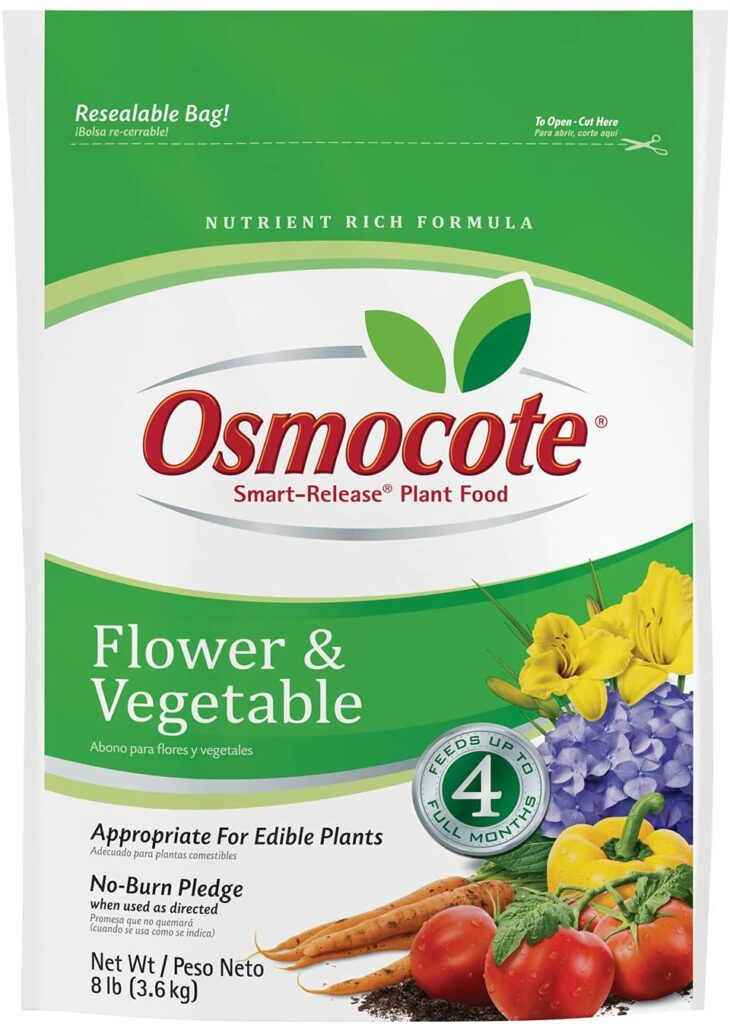
If you are looking for a slow-release fertilizer that can feed your peonies longer, Osmocote Smart-Release Plant Food Flower & Vegetable can do the job for you.
It is a slow-release fertilizer that feeds your plants for up to four months. It uses a unique resin coat to slowly release nutrients that your plants need.
It has an NPK ratio of 14-14-14 that aims to boost root development and bloom production. The formulation of this fertilizer aims to increase bloom production, boost root development, and increase the resistance to diseases, pests, and drought. It’s not only good for flowering plants but also vegetables, tomatoes, melons, and berries.
It is derived from the following materials:
- Polymer-coated ammonium nitrate
- Ammonium phosphate
- Potassium sulfate
- Calcium phosphate
The good point of this fertilizer is it is an all-around fertilizer for most types of plants. It also feeds plants the longest compared to other slow-release fertilizers.
There’s also no trace of urea and harmful chemicals that can pollute the water resources in your area and harm your kids or pets. You won’t also have to deal with the fuzzy smell of a typical fertilizer.
The only disadvantage of this fertilizer is it’s not organic and uses a resin that may take some time to decompose. You may also want to mix it well in the soil so your kids and pets won’t try to touch or eat it.
Pros
- Slow-release fertilizer that feeds your plants for up to 4 months
- No smell
- Versatile NPK ratio applicable to any plants
- No urea
- Contains extra nutrients like calcium
Cons
- Non-organic fertilizer
- Some beads don’t break down over time
9. Carl Pool BR-61 Plant Food
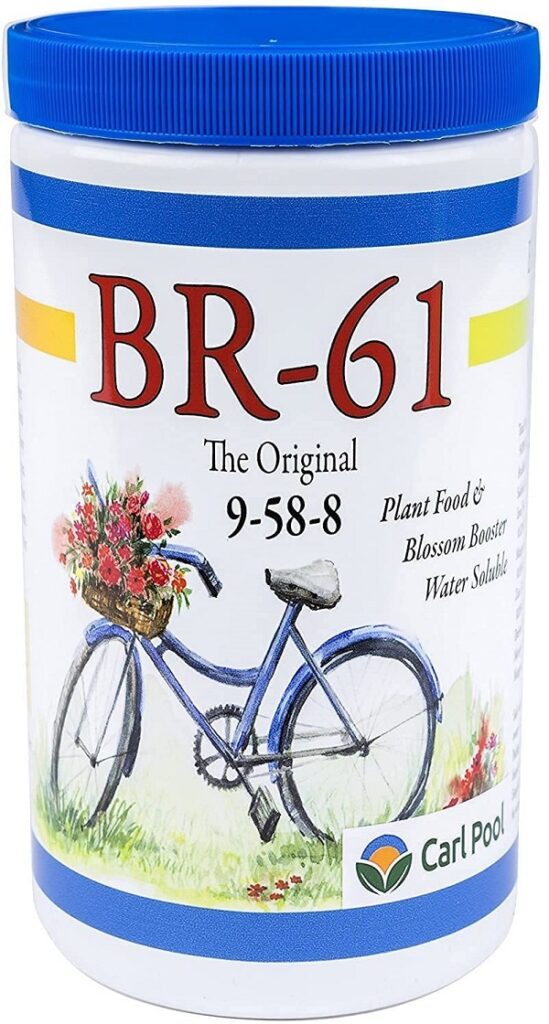
Carl Pool BR-61 Plant Food is among the brands that are gaining popularity for their outstanding performance. It is a water-soluble fertilizer that feeds your peonies from their leaves to their roots. It also has durable packaging that will not degrade until you finish using the whole pack.
This fertilizer has a 9-58-8 NPK ratio that outlasts other fertilizers when it comes to its phosphorus content. The formulation is designed to make your peonies grow bigger and more vibrant flowers. It only takes about one tablespoon of this fertilizer to make a gallon of this fertilizer.
It is derived from:
- Mono ammonium phosphate
- Monopotassium phosphate
- Iron
- Manganese
This fertilizer ensures flexibility since it is absorbed immediately by your plants. You will also witness bigger blooms in ways you have never seen from your plant performance. The contents are also quite simple and don’t contain any harsh chemicals that may contribute to pollution and harm your kids and pets.
Since it has a higher concentration of phosphorus, it might not apply to other types of plants. It is also non-organic which is a factor for some gardeners. On a good note, it doesn’t contain urea and doesn’t smell bad, unlike other organic fertilizers.
Pros
- Affordable
- Durable packaging
- Works best on flowering plants like peonies
- Affordable
- Provides immediate results
- No smell
Cons
- Non-organic and non-vegan fertilizer
- Not be suitable for other types of plants
10. Miracle-Gro Water Soluble Bloom Booster Flower Food
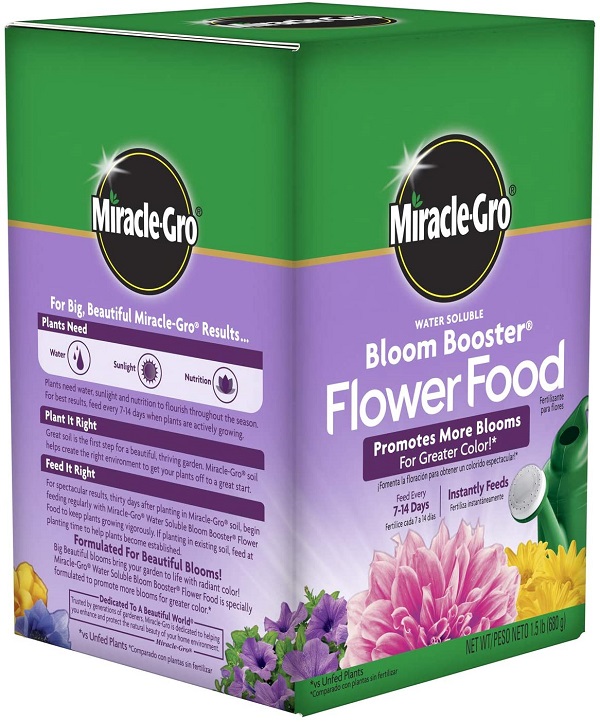
Our list will never be complete without fertilizer from Miracle-Gro. The Miracle-Gro Soluble Bloom Booster is a water-soluble fertilizer that has been popular for its great boost on most perennial and annual flowering plants. It is used every two weeks and the formula is mixed with water, leading to an instant result.
This fertilizer has an NPK ratio of 15-30-15 that aims to boost bloom production and enhance the quality and color of the flowers. You can use it for both in-ground and container plants indoors.
It is derived from the following materials:
- Urea
- Ammonium phosphate
- Urea phosphate
- Potassium Chloride
- Boric acid
- Copper sulfate
- Iron
- Manganese
- Sodium molybdate
- Zinc sulfate
The best feature of this fertilizer is it has a reputation for bringing unhappy flowers to life and produces results almost immediately after application. It also doesn’t smell so gardeners can place them wherever without worrying about dogs desperately sniffing around the house.
Many frustrated gardeners have found some refuge in using this product to revive their unfed plants and boost their blooming performance.
The only concern of gardeners that draws away from this brand is its urea content and preferring an organic alternative. It doesn’t contain any natural ingredients so it may not be safe to place around curious kids and dogs. The packaging may also degrade over time since it is only in a cardboard box.
Pros
- Immediate results
- Promotes bloom production and strong root development
- Revives unfed plants within weeks
- Affordable
- No fuzzy smell
Cons
- Non-organic fertilizer
- Contains urea
Learning More About Growing Peonies
Most gardeners don’t fertilize their peonies. However, they use compost or bone meal whenever they replant their peonies.
Like other perennial flowers, peonies are heavy feeders so they need nutrient-rich soil. Here are other things you need to know about peonies:
- The most suitable type of soil for your peonies is clay loam soil.
- They can benefit from regular fertilizer for perennial flowers with a ratio of 1:2:2 like 10-20-20.
- The best time to fertilize peonies is during early spring when new shoots are showing up and they are 2 to 3 inches high. You can also prepare the soil earlier than spring by putting about 3 centimeters of compost as mulch in late winter or very early spring.
- Peonies love the cool temperatures and thrive in U.S. Department of Agriculture hardiness zones 3 to 9.
- To prepare nutrient-dense soil for your peonies, mix aged compost with 1/2 cup of general fertilizer and 1/2 cup of bone meal.
Tips in Fertilizing Peonies
- Make sure to apply fertilizer on the ring a few inches away from the stem. The ring is where the roots absorb nutrients. If you apply the fertilizer near the stem, your plant will get burned because of too much fertilizer concentration.
- Do not fertilize peonies during spring. You have to wait for the flower buds to be the size of a pea.
- You have to keep your peonies in the same soil where you first planted them. They are quite conscious of their soil environment. To keep them blooming, you have to keep them on the same soil for about two years.
- You can add bone meal and phosphate occasionally during the growing season to boost strong root development and boost their bloom production.
- Watch out for overfertilizing your plants. You’ll know that you overfertilized peonies when they suddenly stopped producing flowers.
- If you’re feeling generous you can feed your peonies two times. The first one is during spring and in early fall. The second one will not make flowers bloom but more of keeping the roots strong. You may also feed them after you deadhead the peonies or cut off the dead blooms.
You might like: How To Deadhead Knockout Roses? & Why It’s Important?
Final Thoughts
Selecting the best fertilizer for peonies can never be easy with the multitude of options in the market.
From our top 10 fertilizers, we selected three of the best performers in their respective features. These include:
- Dr. Earth Bud & Bloom
- Espoma Flower-Tone
- EarthPods Premium Flowering Plant Food
Peonies may not be too picky but treating them with some plant food from time to time will level up their ability to produce better blooms.
After all, who doesn’t love to see big and colorful blooms in their garden? Probably, no one right?
We hope that this post helped ease your burden of looking into every fertilizer in the market and save you from wasting your money on the wrong one. If you find this post informative, please don’t forget to share it with your friends and fellow gardeners.
